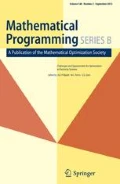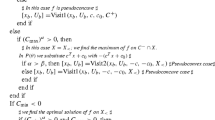Abstract
A new dual problem for convex generalized fractional programs with no duality gap is presented and it is shown how this dual problem can be efficiently solved using a parametric approach. The resulting algorithm can be seen as “dual” to the Dinkelbach-type algorithm for generalized fractional programs since it approximates the optimal objective value of the dual (primal) problem from below. Convergence results for this algorithm are derived and an easy condition to achieve superlinear convergence is also established. Moreover, under some additional assumptions the algorithm also recovers at the same time an optimal solution of the primal problem. We also consider a variant of this new algorithm, based on scaling the “dual” parametric function. The numerical results, in case of quadratic-linear ratios and linear constraints, show that the performance of the new algorithm and its scaled version is superior to that of the Dinkelbach-type algorithms. From the computational results it also appears that contrary to the primal approach, the “dual” approach is less influenced by scaling.
Similar content being viewed by others
References
M. Avriel, W.E. Diewert, S. Schaible, and I. Zang,Generalized Concavity, Mathematical Concepts and Methods in Science and Engineering, Vol. 36 (Plenum, New York, 1988).
A.I. Barros,Discrete and Fractional, Programming Techniques for Location Models, Tinbergen Institute Research Series, Vol. 89 (Thesis Publishers, Amsterdam, 1995).
A.I. Barros and J.B.G. Frenk, “Generalized fractional programming and cutting plane algorithms”,Journal of Optimization Theory and Applications 87 (1995) 103–120.
M.S. Bazaraa, H.D. Sherali and C.M. Shetty,Nonlinear Programming: Theory and Algorithms (Wiley, New York, 2nd ed., 1993).
Y. Benadada, “Approches de résolution du problème de programmation fractionnaire généralisée,” Ph.D. Thesis (Départment d'Informatique et de Recherche Opérationelle, Université de Montréal, 1989).
A. Ben-Israel, A. Ben-Tal and S. Zlobec,Optimality in Nonlinear Programming (A Feasible Directions Approach) (Wiley, New York, 1981).
J.C. Bernard and J.A. Ferland, “Convergence of interval-type algorithms for generalized fractional programming,”Mathematical Programming 43 (1989) 349–364.
B.D. Craven,Fractional Programming (Heldermann, Berlin, 1988).
J.P. Crouzeix and J.A. Ferland, “Algorithms for generalized fractional programming,”Mathematical Programming 52 (1991) 191–207.
J.P. Crouzeix, J.A. Ferland and S. Schaible, “Duality in generalized linear fractional programming,”Mathematical Programming 27 (1983) 342–354.
J.P. Crouzeix, J.A. Ferland and S. Schaible, “An algorithm for generalized fractional programs,”Journal of Optimization Theory and Applications 47 (1985) 35–49.
J.P. Crouzeix, J.A. Ferland and S. Schaible, “A note on an algorithm for generalized fractional programs,”Journal of Optimization Theory and Applications 50 (1986) 183–187.
W. Dinkelbach, “On nonlinear fractional programming,”Management Science 13 (1967) 492–498.
J.A. Ferland and J.Y. Potvin, “Generalized fractional programming: Algorithms and numerical experimentation,”European Journal of Operational Research 20 (1985) 92–101.
J. Flachs, “Generalized Cheney-Loeb-Dinkelbach-type algorithms,”Mathematics of Operations Research 10 (1985) 674–687.
J.B. Hiriart-Urruty and C. Lemaréchal,Convex Analysis and Minimization Algorithms I: Fundamentals, Vol. 1 (Springer, Berlin, 1993).
T. Ibaraki, “Parametric approaches to fractional programs,”Mathematical Programming 26 (1983) 345–362.
T. Ibaraki, H. Ishii, J. Iwase, T. Hasegawa and H. Mine, “Algorithms for quadratic fractional programming problems”Journal of the Operations Research Society of Japan 19 (1976) 174–191.
R. Jagannathan and S. Schaible, “Duality in generalized fractional programming via Farkas' lemma,”Journal of Optimization Theory and Application 41 (1983) 417–424.
J. Outrata, H., Schramm and J. Zowe, “Bundle trust methods: Fortran codes for nondifferentiable optimization, User's guide,” Technical Report 269 (Mathematisches Institut, Universität Bayreuth, 1991).
E. Polak, “On the mathematical foundations of nondifferentiable optimization in engineering design,”SIAM Review 29 (1987) 21–89.
B.N. Pschenichnyi,Necessary Conditions for an Extremum (Marcel Dekker, New York, 1971).
A. Ravindran, “A computer routine for quadratic and linear programming problems,”Communications of the ACM 15 (1972) 818.
A.W. Roberts and D.E. Varberg,Convex Functions (Academic Press, New York, 1973)
R.T. Rockafellar,Convex Analysis (Princeton University Press, Princeton, NJ, 1970).
R.T. Rockafellar, “Generalized subgradients in mathematical programming,” in: A. Bachem, M. Grötschel and B. Korte, eds.,Mathematical Programming. The State of the Art (Springer, Berlin, 1983) ch. 2, pp. 368–390.
S. Schaible, “Fractional programming,”Zeitschrift für Operations Research 27 (1983) 39–54.
S. Schaible and T. Ibaraki, “Fractional programming,” (Invited Review),European Journal of Operational Research 12 (1983) 325–338.
N.Z. Shor,Minimization Methods for Non-differentiable Functions, Computational Mathematics, Vol. 3 (Springer, Berlin, 1985).
M. Sion, “On general minimax theorems,”Pacific Journal of Mathematics 8 (1958) 171–176.
J. Werner, “Duality in generalized fractional programming,” in: K.H. Hoffman, J.B. Hiriart-Urruty, C. Lemaréchal and J. Zowe, eds.,Trends in Mathematical Optimization, International Series of Numerical Mathematics (Birkhäuser, Basel, 1988) pp. 197–232.
Z. Zhou, F.S. Mokhtarian and S. Zlobec, “A simple constraint qualification in convex programming,”Mathematical Programming 61 (1993) 385–397.
Author information
Authors and Affiliations
Additional information
This research was carried out at the Econometric Institute, Erasmus University, Rotterdam, the Netherlands and was supported by J.N.I.C.T. (Portugal) under contract BD/707/90-RM.
Rights and permissions
About this article
Cite this article
Barros, A.I., Frenk, J.B.G., Schaible, S. et al. A new algorithm for generalized fractional programs. Mathematical Programming 72, 147–175 (1996). https://doi.org/10.1007/BF02592087
Received:
Issue Date:
DOI: https://doi.org/10.1007/BF02592087



